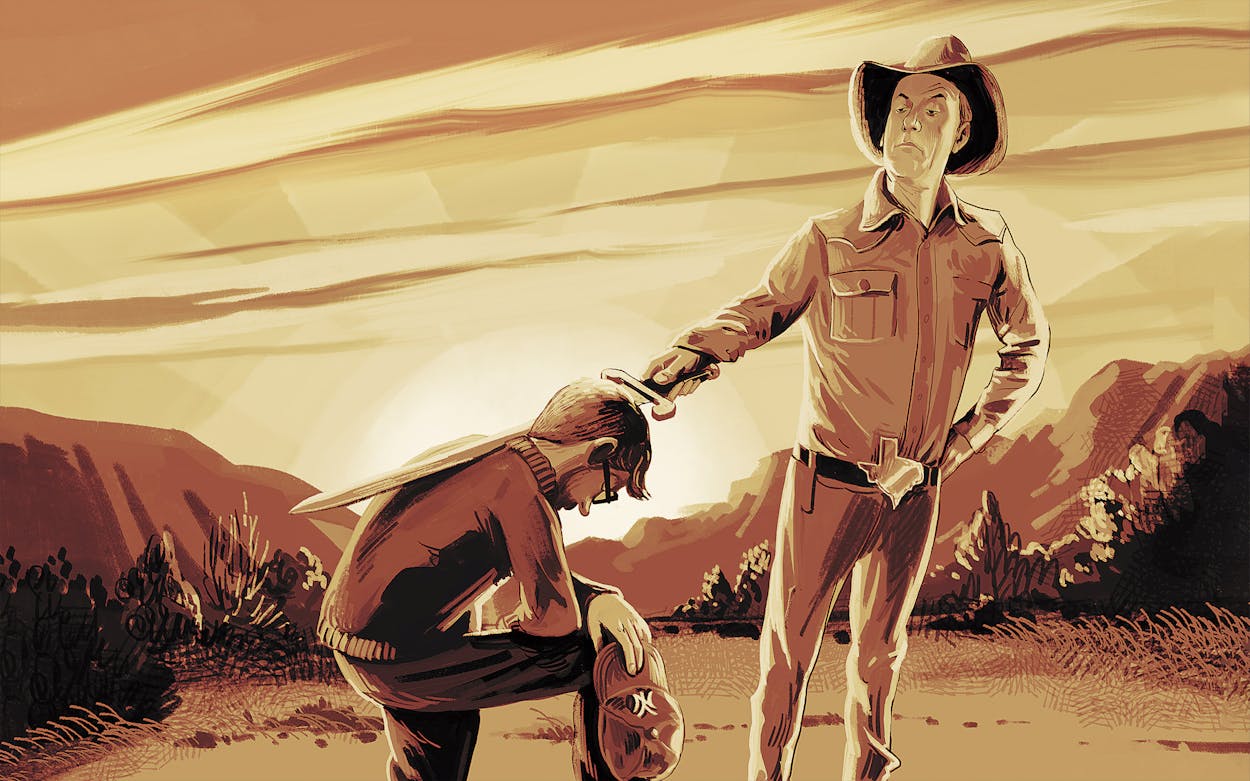Q: I’ve heard of this or that famous person being named an honorary Texan, but who gets to decide who makes the cut? And how does someone qualify?
Mike Konczal, Plano
A: Among the many flattering designations with which a person might be dubbed—dame, grande dame, world champion, supreme potentate, “world’s greatest purveyor of fine advice and keen observations,” et cetera—the label “Texan” is perhaps the most awe-inspiring.
To be a Texan, after all, means that you are hailed—or, at a minimum, recognized—the whole world over. Even in the farthest-flung corners of Africa, Asia, Australia, Europe, North America, South America, Antarctica, and the lost continent of Lemuria, you’d be hard put to find a soul who is unfamiliar with the Lone Star State.
A few years ago, for instance, while doing his best to complete a transaction with a seaside coconut vendor on a remote island off the Yucatán Peninsula, the Texanist, as is his custom, was attempting to relay his place of origin to the confused young man by way of some badly broken Spanish, a slew of animated gesticulations, a variety of grunts, and the syrupy-slow repetition of the word “Texas.” When the patient vendedor de cocos eventually lit up and responded with three celebratory shots—bang, bang, bang—from his two finger pistols and let loose with an enthusiastic “Texas!” the Texanist knew a breakthrough had been achieved. Later that very afternoon, when the same young man sold the Texanist a cold and refreshing mango, he greeted this proud son of the Lone Star State once again with a spirited “Texas!”
Apologies for the digression, but you see what the Texanist is saying. Wherever Texans go, folks know the place from whence they came. Or at least a crude stereotype of the place from whence they came. Worldwide familiarity, though, is not the only perk to being a Texan. We also get to enjoy an oversized—Texas-sized, some might say—pride in our Texanness. Do Connecticuters, Illinoisans, Michiganders, New Mexicans, Oklahomans, Oregonians, or Dakotans of either the northern or southern persuasion so unashamedly wallow in the sense of identity they derive from being associated with those particular places? The Texanist doubts it.
Because Texas is viewed as such an extraordinary place, receiving the title of honorary Texan is regarded by many non-Texans as a great privilege. Do other states even grant such symbolic citizenship? Is there such a thing as an honorary Oklahoman? Before researching this column, the Texanist would have bet against it. After delving into the matter, though, the Texanist realizes he would have lost such a wager. Oklahoma does, in fact, bestow honorary Oklahoman titles. Ask Carol Channing. And so do many other states, though the Texanist can’t help but wonder who in the heck is hankering to be named an honorary Connecticuter.
In the service of pulling on this thread, the Texanist did a little googling and was able to informally determine that honorary Texas citizenship is far more popular than the honorary citizenship of any other state. “Honorary Oklahoman,” for instance, gets 524 results. “Honorary Floridian” turns up 992 links. “Honorary Californian,” 5,950. Interestingly, “honorary Connecticuter” turns up diddly-squat. “Honorary Texan,” by contrast, results in a Texas-sized 33,200 hits.
This hearteningly popular tradition of naming people honorary Texans reportedly dates back to the thirties, and over the course of the near-century that this practice has endured, many well-known individuals have received the distinction. Unfortunately, there exists no master catalog of recipients. But if there were such a list, it would include the likes of Chet Atkins, the comedic Mexican actor Cantinflas, Phil Collins, Russell Crowe, Italian-born sculptor Pompeo Coppini, Bob Dylan, the nineteenth-century Italian revolutionary Giuseppe Garibaldi (the rare posthumously granted designation, proffered in 2011 on the occasion of the 150th anniversary of Italian unification to acknowledge a man who was “a defender of liberty, much like those who gave their lives at the Alamo”), Rudy Giuliani, Bob Hope, General Douglas MacArthur, Shirley MacLaine, Don McLean, Chuck Norris, Sarah Palin, Arnold Palmer, Houston Oilers quarterback Dan Pastorini, Prince Michael of Kent and Princess Michael of Kent (a.k.a. Michael George Charles Franklin and Baroness Marie-Christine Anna Agnes Hedwig Ida von Reibnitz), Red Skelton, Arnold Schwarzenegger, the U.S. Army’s 100th Infantry Battalion and 442nd Regimental Combat Team (recognized for, in 1944, saving the 1st Battalion of the 141st Regiment, a.k.a. the “Lost Battalion,” which was made up of Texas troops), the parents of Jerry Jeff Walker, and John Wayne (another posthumous honor, granted in 2015, 36 years after the Duke moved on to that great cattle roundup in the sky).
While making his way through some of the honorary Texan files located at the Lorenzo de Zavala State Archives and Library Building, in Austin, the Texanist paused when he came across the name Robin Doughty, a scholar in the field of geography who instructed the Texanist at the University of Texas at Austin in the eighties. In the same boxes, the Texanist also came across the name of one of his professional forebears, Iowa-born Abigail Van Buren, the original Dear Abby. It’s a small world, thought Awestruck in Austin.
Famous folks and former college professors of the Texanist’s, however, do not make up the bulk of honorary Texans. In fact, such illustrious individuals represent but a small fraction of the total. There are oodles of everyday honorary Texans who have received the distinction while flying under the radar.
To get a general idea of the numbers, it’s helpful to know that Governor Greg Abbott has, since 2015, signed off on more than one thousand honorary Texanhoods. Among this throng are, no doubt, children born out of state to Texas parents or children born out of state who were adopted by Texas parents, newly arrived residents looking to fast-track the assimilation process, visiting dignitaries, and fans of Texas who are celebrating notable birthdays.
Gubernatorial decree, however, is not the only way that a person can become an honorary Texan. The two chambers of the Texas Legislature, working separately or jointly, may also, via resolution, confer the honor upon an individual—though the governor may be required to sign off on such legislation to make it official. This is how Phil Collins, country singer Leona Williams (who actually recorded an album titled Honorary Texan), and running back Ricky Williams, among many others, became honorary Texans.
So, to answer the first portion of your query, Mr. Konczal, it’s most often the governor who decides, sometimes with a prod from the Lege. As to what qualifies someone to be an honorary Texan, well, that’s a bit simpler, because there appear to be no guidelines. The only ironclad rule seems to require that the candidate hasn’t lived much of his life in Texas.
If anyone finds even that minimal criteria too onerous, it should be noted that there are some less formal routes to honorary Texanhood, though these don’t carry the heft of any sort of official governmental imprimatur. The Texanist is speaking of credentials and items obtained through the novelty trade—semiofficial-looking certificates, bumper stickers, T-shirts and the like that feature the phrase “Honorary Texan,” often rendered in a hokey faux–Old West typeface or emblazoned on a Texas flag.
Or, if one has the resources, one can make a Hollywood feature film set in Texas and be named an honorary Texan by the Alamo’s Instagram account, as recently happened to the writer and director of this year’s well-received Vengeance, Massachusetts-born actor B. J. Novak, previously of television’s The Office.
So that’s how all that works, Mr. Konczal. Thanks for the letter. And let the Texanist close by noting that even though being named an honorary Texan doesn’t carry any actual real-world powers or privileges—much as a ceremonial key to a city isn’t paired with an actual lock and won’t allow the holder access to anywhere they can’t already go—the Texanist figures that it’s still preferable to being dubbed an honorary Oklahoman. Or even the world’s first honorary Connecticuter.
Have a question for the Texanist? He’s always available here. Be sure to tell him where you’re from.
This article originally appeared in the December 2022 issue of Texas Monthly. Subscribe today.
- More About:
- The Texanist
- Plano









